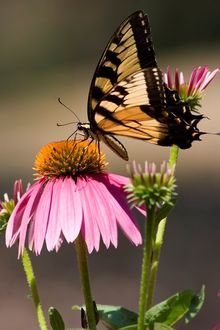
When it comes to defeating pests and diseases in your garden, the best possible defense is an all-natural offense. Traditional pesticides are harmful to our health, especially for children and pets. Good gardening practices help plants outgrow weeds naturally and protect good bugs that eat pests. If pests do become a problem, natural pest controls are a smarter option and they are safe for people, pets and wildlife.
- Follow the other steps of natural yard care to build strong, pest-resistant plants.
- Identify pests, weeds or diseases before using any controls. Only 5 percent of bugs in your yard are pests!
- Try non-toxic controls (i.e. traps, barriers, fabric row covers, soaps or horticultural oils) first.
- As a last resort, choose the least toxic chemical pesticides and follow label directions precisely.
- Learn to recognize beneficial insects – nature’s best pest managers.
Benefits
- Keep your family – especially children and pets – safe from the dangers of pesticides.
- Save money you would have spent purchasing chemicals.
- Save time you would have spent applying chemicals.
- Prevent pesticides from polluting the natural environment.
Pesticides detected in local streams
Scientists have studied urban streams in Puget Sound, including Bellevue’s streams. Twenty-three pesticides (weed and bug killers) were detected during rainstorms. Rain also picks up fertilizer as it washes over our yards, sending untreated runoff into streams. These chemicals can poison salmon and other wildlife. Overuse of garden chemicals can also damage soil and plant health. Avoid using quick-fix chemical solutions to solve garden problems. Practice natural lawn and garden care instead.
Additional Resources
Fertilizing GuidePests, Weeds and Diseases Guide
Good Bug Guide
Grow Safe
